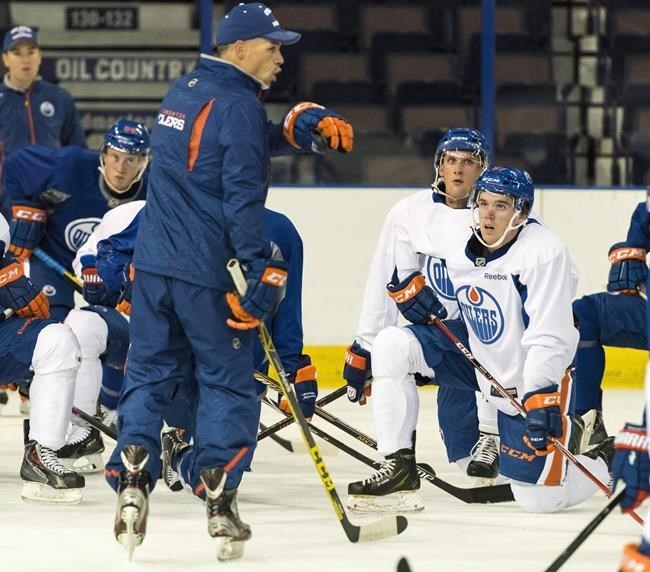Connor McDavid couldn't believe what was in front of him.
The No. 1 pick at the 2015 NHL draft was starting his rookie season with the Edmonton Oilers. Everything was new — new city, new team, new way of doing things.
McDavid noticed a bunch of big numbers scribbled in the locker room one day.
It was his introduction to the practice of putting "money on the board" — a tradition where players offer to pay teammates out of their own pockets for things like goals or points in a game of personal importance.
NHLers have plenty of eye-opening, welcome-to-the-league moments on the ice.
And there are plenty of similar instances away from the spotlight.
"Money on the board was, for sure, one," McDavid, now captain of the Oilers and the face of the league, recalled at the recent NHL/NHLPA player media tour. "I'd never seen that before. I was shocked to see thousands of dollars going on the board.
"Like, that's insane."
Players putting up cash incentives for teammates as an extra reward for a victory often happens ahead of a rookie's first game or a matchup against a former team.
"Definitely things about being a pro that take time to learn," McDavid added.
Anaheim Ducks winger Troy Terry made his NHL debut at the tail end of the 2017-18 season after leaving the University of Denver.
He was told about putting money on the board, but had no idea how the process worked.
Another issue? Terry had also yet to collect a paycheque.
"Didn't know if you had to pay immediately after the game because I didn't have any money," he said. "I'm like, 'I haven't been paid.'"
Learning to pack — and more importantly, how much to bring — for travel was another test for some now-NHL veterans.
"I'd never really been in a situation where I'm packing for a 10-day road trip," Montreal Canadiens sniper Cole Caufield said.
He was also blown away by how little some teammates loaded onto the plane.
"Trip out west (and) Christian Dvorak brought one duffel bag," Caufield added with a smile. "One suit and one duffel bag. It was like, 'Are you sure?'
"The older guys know what they're doing. They bring what they need, not what they might need."
Vancouver Canucks captain Quinn Hughes had a mishap early in his career.
"You're always learning little things," he said. "Forget your dress shoes for one road trip and you'll never do that again."
Terry said transportation to and from the rink also took some getting used to.
"I got on the bus 20 minutes early for my first game ... I sat there for 20 minutes," he said. "And my mom brought me the wrong suit because I signed out of college.
"The first time I ever went and bought something with my own money was pretty cool."
Arizona Coyotes winger Clayton Keller said another form of travel — flying on chartered planes — stuck out to him entering the league.
"Super cool," he said. "You finish a game somewhere and then you're off to the next city."
Added Dallas Stars forward Jason Robertson: "That was the biggest thing, not having to go through the airport."
Seattle Kraken centre Matty Beniers, meanwhile, had his jaw hit the floor when he first saw the accommodations.
"I was sending pictures in my hotel room to my parents going, 'This is awesome!'" said last season's Calder Trophy winner as rookie of the year.
Set to begin his 11th NHL season, New York Rangers captain Jacob Trouba enjoyed figuring things out on his own.
"I was 19 and thrust into living this adult life, and I was by no means an adult," the defenceman said of his start with the Winnipeg Jets. "There were times I wouldn't open my suitcase and just leave for the next road trip with the same suitcase — just assume what was in there was what I needed. It's not like that anymore. You unpack your bag and you live a more structured life with a wife and a family.
"You're not living in a frat house with Mark Scheifele and Adam Lowry."
New Jersey Devils centre Jack Hughes — Quinn's younger brother — said playing in the NHL at age 18 was a big-time challenge when the equipment was off.
"You're in high school, you're living at your parents' house, you have your high school girlfriend, doing normal kid things," said the top pick in 2019. "A year later, you're making a million dollars playing against the guys you look up to."
Hughes added he wouldn't change his path, but there were struggles.
"It's pretty cool looking back where I was to where I am now," he said. "The hockey's hockey. It's never going to change.
"Lifestyle-wise ... it's completely different."
Rangers defenceman Adam Fox and teammate Ryan Lindgren used to park at a specific garage in Manhattan to get a better rate before walking the 15 minutes to Madison Square Garden.
"You don't really have the concept of how much money you're making," Fox said with a chuckle. "We caught a little heat for that at the time. But coming out of college ... the parking garages in New York City, I don't know if you've seen how much they cost. It spooked us.
"Now we're a little more adapted to having money."
And, when called upon, putting it on the board.
This report by The Canadian Press was first published Oct. 2, 2023.
Joshua Clipperton, The Canadian Press



